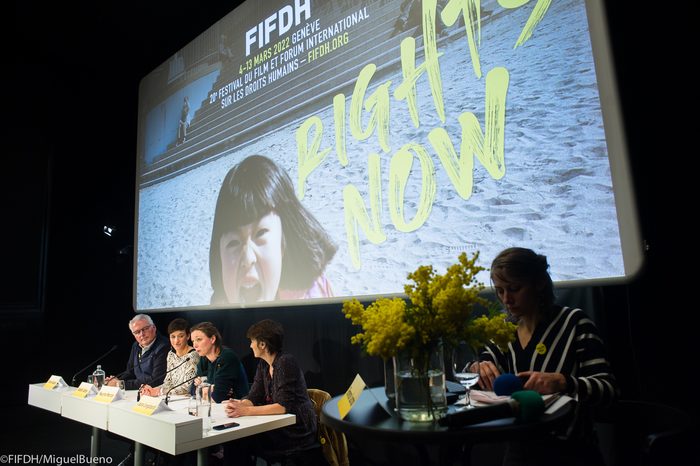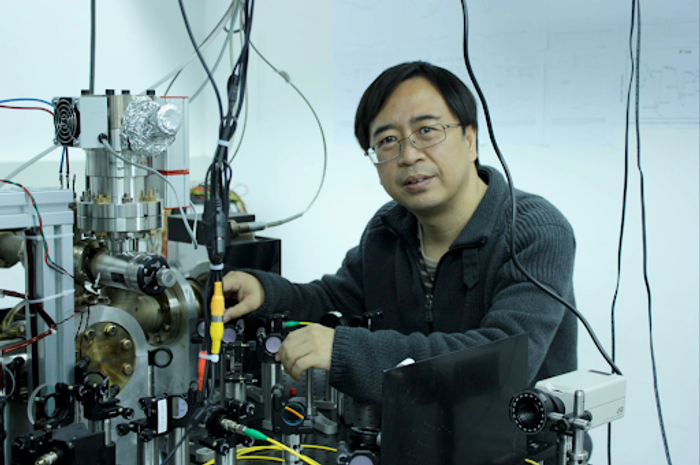Good morning, this is Kasmira, and today we’re covering the return of FIFDH, Geneva’s hallmark international human rights film festival, to the big screen after two years online.
And following the Taliban’s visit to Geneva last week, guarantees for Afghan women’s rights are still nowhere to be found, writes Afghan journalist Tooba Neda Safi. |

|

FIFDH organisers revealed the programme for its 20th edition at a press conference on Tuesday 15 February. (Photo: FIFDH/Miguel Bueno)
|
|
📽️ Geneva’s human rights film festival stages its big comeback.
When Covid struck in early 2020, Geneva’s International Film Festival and Forum on Human Rights (FIFDH) was one of the first major cultural events forced to move online. Two years and three editions later, the festival is making its comeback to cinemas and other venues across Geneva, from 4-13 March, after unveiling its programme of film screenings, interviews and debates on Tuesday. Isabelle Gattiker, FIFDH’s outgoing artistic director, told journalists emotions were running high in the run-up to this edition, which will also mark 20 years since the film festival was first launched.
Geneva Solutions (EN)
|
|
Here's what else is happening
|

Women in Burka in Kunduz City on humanitarian Aid. (Photo: Wanman Uthmaniyyah/ Unsplash)
|
|
|
Science and diplomacy reads by GESDA
|
|

Chinese quantum physicist Jian-Wei Pan. (Credit: Science and Technology University of China)
|
|
Quantum Computers have been said to be the next big revolution in technology,
but the hype around these tools has been almost as high as the hopes about what big problems they could solve – and do so differently and more quickly than classical computers, as an interesting article in Physics tells. Hence the necessity to take any prediction with a grain of salt.
But when the claim comes from one of the most discreet but acclaimed scientists in the field, renewed attention must be paid. Jian-Wei Pan, who is now driving Chinese efforts in quantum technologies, estimates that the next big breakthrough, giving quantum computers the advantage over classical ones, will happen in about five years. He said to the Spanish daily El Pais (see below) that, “building a practically useful fault-tolerant quantum computer is one of the great challenges for human beings. I am concerned about how and when we will build one. The most formidable challenge for building a large-scale universal quantum computer is the presence of noise and imperfections. We need to use quantum error correction and fault-tolerant operations to overcome the noise and scale up the system. A logical qubit with higher fidelity than a physical qubit will be the next breakthrough in quantum computing and will occur in about five years. In homes, quantum computers would, if realised, be available first through cloud services.”
Time only will say if Chinese predictions are better than occidental hype. But one thing is sure: the race is global, and the winner will get an immense advantage by disposing of an extremely powerful computing tool.
Olivier Dessibourg, GESDA
(EN)
|

This selection is proposed by the Geneva Science and Diplomacy Anticipator
GESDA, working on
anticipating cutting-edge science and technological advances to develop innovative and inclusive
solutions for the
benefit of the planet and its inhabitants.
|
|
GS news is a new media project covering the world of international cooperation and development. Don’t hesitate to forward our newsletter!
Have a good day!
|

|
|
Avenue du Bouchet 2
1209 Genève
Suisse
|
|
|
| |











